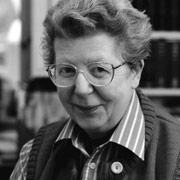
When I think of poets who have been generally loved, that is to say loved by those who are not normally readers of poetry - and I think here primarily of Betjeman and Larkin and, in a different way, Wendy Cope and, again in a slightly different way, our current Laureate, Carol Ann Duffy - I naturally think of UA, as she liked to be known. The commemoration service at St Mary's, Wootton-under-Edge was packed mostly by local people to whom UA and Rosie Bailey clearly stood for something admirable and lovable that extended beyond books of poetry.
Wotton-under-Edge is heart of England, and UA wrote a great deal about England. It was a reciprocal love which means it tells us about both UA and England. Betjeman and Larkin were both eccentrics after a fashion, oddities who stood for a certain caricature of what the English found attractive and, in some ways, aspired to, meaning individuality as manageable, recognisable difference. Betjeman with his churches, teddy-bears, underground stations, self-mocking humour and fear of death was the loveable uncle; Larkin with his curmudgeonliness, his post-war, dry, matter-of-factness and lyricism about residual nature, was the stern unliterary librarian, the wry remark at the bar, the solitary, the man in the distance removing his cycle clips in awkward reverence, Mr Bleaney, the loner at the boarding house who'd never take a garden properly in hand. The toad that squatted on Larkin perfectly represented the toad that squatted on everyone. (How did you come upon the image of the toad for work? asked the Paris Review. Sheer, genius, Larkin replied.) Both Betjeman and Larkin spoke for everyone from a position tolerably outside everyone. They were the eccentrics that sounded the norm.
UA was clearly gay and dressed it. Her double act with Rosie was a mixture of the joyful, the wise, and the jolly, almost boy-scout, camp. The act was loved somewhat in the way music hall was. It was dressing up for the party, safe, and yet a blow for liberation, in the sense that whatever is camp in us - and there is a considerable amount in the English persona - could find an echo there. It was warm, generous, affectionate, comfortably outrageous. At the same time, her poems were born out of deep, common feelings, precisely and plainly articulated, that could never be described as camp. The life of the emotions was set to wisdom. It was a kind of secular charitable anglicanism. I would have had no difficulty in seeing UA play the role of Trollope's Warden. Members of the same parish. All three, Betjeman, Larkin and UA can be read in the light of class without diminishing any of them. All three are members of the same unruly congregation.
The loved English poets are loved in the way people love their follies: as romances, as extensions of latencies that spring out of themselves. These English - and they do not represent all England, which is distinctly a various place - are realists with a tolerance for caricature and a sense of the mystical perceived in unlikely places. The persona is music hall but the feeling is solid and reassuring as the landscape it is set in.

No comments:
Post a Comment